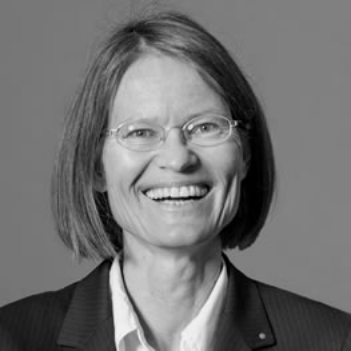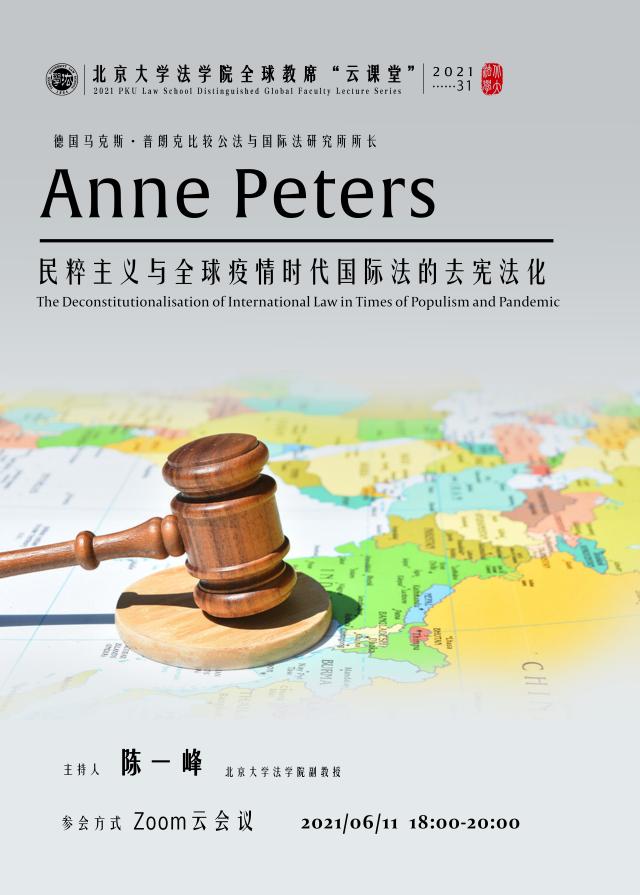全球教席云课堂31讲
题目:民粹主义与全球疫情时代国际法的去宪法化(The Deconstitutionalisation of International Law in Times of Populism and Pandemic)
时间:2021 年 6 月 11 日(周五)18:00-20:00
ZOOM 云会议 ID:945 1416 7302(密码:350164)
开讲学者:
Anne Peters
德国马克斯·普朗克比较公法与国际法研究所所长
主持人:
陈一峰
3354cc金沙集团副教授
开讲学者简介:

Anne Peters教授为德国马克斯·普朗克比较公法与国际法研究所所长(2013年3月1日起任),兼任德国海德堡大学3354cc金沙集团教授、弗赖堡大学3354cc金沙集团教授、瑞士巴塞尔大学3354cc金沙集团教授、美国密歇根大学L. Bates Lea全球法学教授。她是欧洲国际公法学术研究的领军人物之一,主要研究方向包括国际公法、欧洲宪法、比较宪法、国际人权法等。
Peters教授先后求学于德国维尔茨堡大学、瑞士洛桑大学、德国弗赖堡大学(1994年获得德国弗赖堡大学法学博士学位)、美国哈佛大学(1995年获得美国哈佛大学法学硕士学位)。她曾任格鲁吉亚冲突问题国际实况调查团法律专家(2009年)、欧洲国际法学会会长(2010年-2012年)、欧洲理事会“通过法律实现民主”威尼斯委员会德国代表(2011年-2015年)等,并曾在德国宪法学会和国际宪法学会等多个学术团体的管理委员会任职。
Peters教授目前担任德国联邦外交部国际法委员会成员、国际法协会使用武力委员会成员、德国国际法学会会长和巴塞尔治理研究所董事会副会长。
Peters教授具有丰富的法律实务经验和深厚的学术理论功底,所著的《国际法史手册》曾于2014年获美国国际法学会图书奖。多年来,她受邀赴世界各地知名大学访问、讲学,也曾多次到访3354cc金沙集团。她丰富的学识和精彩的讲授得到师生的广泛赞誉。Peters教授目前的研究兴趣涉及国际公法的各个方面,包括其历史、全球动物法、全球治理以及人类在国际法中的地位。
Anne Peters is Director at the Max Planck Institute for Comparative Public Law and International Law Heidelberg (Germany), and a professor at the universities of Heidelberg, Freie Universität Berlin, Basel (Switzerland), and a L. Bates Lea Global Law professor at the Law School of the University of Michigan.
She was a member (substitute) of the European Commission for Democracy through Law (Venice Commission) in respect of Germany (2011-2015) and a legal expert for the Independent International Fact-Finding Mission on the Conflict in Georgia (2009). She was the President of the European Society of International Law (2010-2012), has served on the governance board of various learned societies such as the German Association of Constitutional Law (VDStRL) and the Society of International Constitutional Law (I CON-S), and she is currently President of the German Society of International Law (DGIR) as well as the Vice-President of the board of the Basel Institute of Governance (BIG).
Anne was a fellow at the Wissenschaftskolleg in Berlin, and held visiting professorships at the universities of Beijing (Beida), Paris I, Paris II, and Sciences Po. Born in Berlin in 1964, Anne studied at the universities of Würzburg, Lausanne, Freiburg, and Harvard, and held the chair of public international law at the university of Basel from 2001 to 2013. She obtained the Habilitation-qualification at the Walther-Schücking-Institute of Public International Law at the Christian Albrechts University Kiel on the basis of her Habilitation-Thesis “Elemente einer Theorie der Verfassung Europas” (Elements of a Theory of the Constitution of Europe) in 2000.
Her current research interests relate to public international law including its history, global animal law, global governance and the status of humans in international law.
讲座摘要:
法治、人权与民主的三位一体是否已经被(民粹主义的)主权、安全和发展理念所取代?全球宪法主义能够或应当逃离新自由主义的困境吗?
国际组织和区域组织在民族国家中推行宪法标准,尽管国家表示反对乃至退出组织,但这种推行并未停止;这些组织大部分都继续沿着扩大参与,增加透明度,强化责任的路径改进其工作方法;当前疫情也同样说明我们需要全球宪法主义。除非每个人都安全,否则我们谁也不安全,只有全世界共同努力,才能结束全球大流行病。这种理念正是受到了更高“宪法”原则的指引。
但亚洲不断增长的政治经济影响力,威权主义政府的增多,公司准主权与数字媒体支配地位的出现,全球化下分配结果的显著不公以及生态危机,都是全球宪法主义构建任务中必须回应的方面。另外,全球宪法主义还需要应对当前的思想风潮:对全球化的愤慨,对人权幻想的破灭,对民粹主义、保护主义和民族主义的追求以及对科学与事实的怀疑。
在这种复杂环境下,全球宪法主义必须批判性地审视其殖民主义遗留,超越欧洲中心主义,支持多视角研究,并建立起其最重要的第四大支柱,即跨国团结和社会权利,才能够摆脱僵局。
Has the trinity of rule of law, human rights, and democracy been replaced by the ideals of (populist) sovereignty, security, and prosperity? Can and should global constitutionalism be rescued from its neoliberal entrapment?
International and regional organisations still promote constitutionalist standards in nation states despite backlash and withdrawals. And most of these institutions continue to improve their own working methods in the direction of more inclusion, transparency, and accountability. Also the current pandemic illustrates that we need global constitutionalism. Because no one is safe until everyone is safe, the disease can be overcome only in a globally concerted effort, ideally guided by higher ‘constitutional’ principles.
But the programme of global constitutionalism needs to react to the new material conditions of an increased political and economic clout of Asia, the spread of authoritarian governments, the rise of corporate quasi-sovereignty and digital media dominance, the starkly unequal distribution of the fruits of globalisation, and ecological disaster. It also needs to respond to the new ideational climate: anger over globalisation, disillusionment with human rights, the appeal of populism, protectionism and nationalism, and distrust of science and facts.
In this constellation, global constitutionalism can avoid marching on in a zombie mode only if it critically reviews its colonialist legacy, overcomes Eurocentrism, espouses multiperspectivism, and most of all builds up its fourth pillar: transboundary solidarity and social rights."
讲座海报:

对外事务办公室
2021年6月4日
